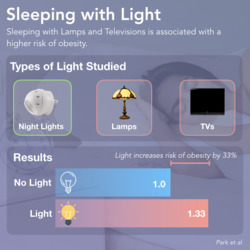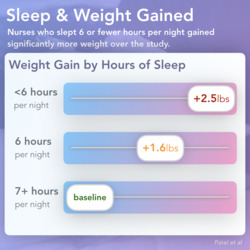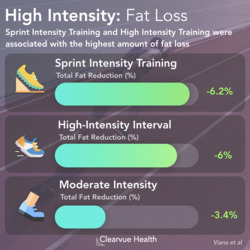
Figure 1: BMI with low fruit and vegetable consumption. At least 20% of BMI is driven by genetic risk factors. Individuals with many genetic risk factors gained more weight over the course of the study than those who had fewer genetic risk factors. Researchers studied 8,943 women and 5,308 men across 20 years within two cohorts: the Nurses' Health Study and Health Professionals Follow-Up Study. Genetic risk factors were assessed with 77 SNPs associated with BMI.
As you may have guessed, genetics plays a significant role in obesity risk. There are certain genes that cause individuals to gain weight. There are certain gene variants passed from parents to children that lead to a higher risk of obesity.
However, genetics are not fate. In total, researchers estimate that genes are only responsible for around 20% of obesity risk.
This means that while genetics are important, other factors such as diet, exercise, and personal choices play a much larger role in obesity.
A new study has found that eating lots of fruits and vegetables can be particularly effective in counteracting a genetic risk of weight gain.
Researchers found that all individuals who did not eat many fruits and vegetables gained weight over the four years of the study.
As expected, those with many weight gain genetic risk factors gained more weight than those with few genetic risk factors.
Source: Improving fruit and vegetable intake attenuates the genetic association with long-term weight gain
Effects of High Fruit + Vegetable Consumption

Figure 2: Effects of High Fruit + Vegetable Consumption. Eating lots of fruits and vegetables protect individuals with genetic obesity risk from gaining weight. Those with many obesity genes experienced an average BMI change of -0.01. Those with few obesity genes experienced an average BMI change of -0.04. Researchers studied 8,943 women and 5,308 men across 20 years within two cohorts: the Nurses' Health Study and Health Professionals Follow-Up Study. Genetic risk factors were assessed with 77 SNPs associated with BMI.
However, things got a little more interesting when it came to the fruit and vegetable eaters.
Regardless of genetic risk, individuals who ate lots of fruits and vegetables on average were protected against weight gain and lost a little bit of weight. Differences between individuals with high genetic risk and low genetic risk were small.
This suggests that the power of eating healthy is stronger than the power of genetics when it comes to diet and weight loss.
Source: Improving fruit and vegetable intake attenuates the genetic association with long-term weight gain
Fruits vs Vegetables for BMI
Figure 3: Fruits vs Vegetables for BMI. Fruits and vegetables offer similar protection against weight gain. They both counteract genetic risk. Individuals who ate less fruit experienced significant weight gain over the course of the study compared to those who ate a lot of fruit. Those who ate fewer vegetables also had a similarly significant increase in their BMI. Researchers studied 8,943 women and 5,308 men across 20 years within two cohorts: the Nurses' Health Study and Health Professionals Follow-Up Study.
When it comes to protecting against weight gain, both fruits and vegetables are effective.
Researchers found that when it examined individually, high consumption of either fruits or vegetables were both associated with protection against weight loss among individuals who had a high genetic risk of weight gain.
Source: Improving fruit and vegetable intake attenuates the genetic association with long-term weight gain
Best Fruits + Vegetables for BMI
Figure 4: Best Fruits + Vegetables for BMI. Berries and green leafy vegetables offered significant protection against weight gain for those with weight genes. Each bar is scaled to the relative effect size for each type of food. White lines represent error bars. Berries, leafy green vegetables, and citrus fruit consumption were all associated with significant protection against weight gain.
Among the fruits and vegetables studied, four, in particular, stood out as particularly effective in protecting against weight gain.
There are probably many more effective fruits and vegetables not mentioned above. These are just the ones that were surveyed and stood out in this particular study.
Keys to Health
These results provide solid evidence that you can overcome a genetic predisposition for obesity with a good diet.
As with any nutrition study, there is a significant risk of bias in these results. We certainly would not recommend that anyone load up on berries solely on the basis of this research.
These types of survey-based studies can only tell us that people who eat lots of berries tend to weight loss. They do not necessarily show that eating more berries will cause weight loss.
However, it does provide interesting evidence on specific food types that may protect against obesity. Both fresh fruit and vegetables were equally associated with a reduction in weight gain, which is interesting as fruit does contain significant amounts of sugar.
Much of the data in this nutrition study is self-reported, which has several limitations and sources of bias. Self-reported data, which is obtained through surveys and questionnaires, is the most feasible way of collecting data from large subsets of the population. However, the data may suffer from recall bias, where respondents may forget certain details or may not accurately remember details. They may also suffer from social desirability bias, where respondents may be reluctant to admit to socially undesirable behaviors, even if the survey is anonymous.
+
Sample Size - This study used a large enough sample set to show significant differences.
+
Study Type - This study used a prospective cohort method. This method is not as robust as a clinical trial, but can still yield useful insights.
+
Effect Size - This study found significant and clinically relevant effects for fruit and vegetable consumption.
-
Self Reported Data - Self reported information tends to be prone to bias.








